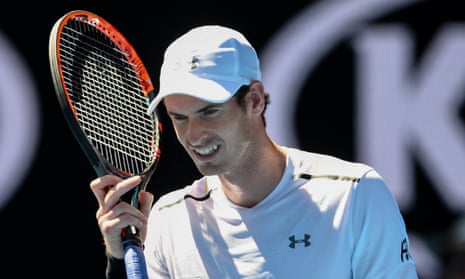Andy Murray’s progress at grand slams is rarely serene, but this one might be about to get unexpectedly rocky. The world No1 goes into the second round of the Australian Open after a nervous three-set victory against the world No93 Illya Marchenko and will be confronted on Wednesday by a combative Russian teenager with a track record of belligerence and a history of boxing, Andrey Rublev.
Murray, a keen fight fan, was unaware that the 19-year-old Rublev is the son of a former amateur pugilist of the same name and, even though he is a similarly keen student of his own sport, he might not know that junior has stirred a little controversy in his short career.
Two years ago at a Challenger event in Moscow, the Argentinian Renzo Olivo complained that young Rublev had been “intimidating”, without levelling specific allegations. He was upset that no action was taken against him.
Fernando Verdasco was also upset with Rublev’s behaviour when he lost against him in Barcelona earlier that year. “I am surprised how rude he is for a 17-year-old,” the Spaniard said at the time. “He shows little respect for his opponent.”
Rublev, who is mystified by the criticism, says of his boxing background: “My dad was a boxer – I was even doing boxing as well. He never pushed me but we practised sometimes also. He boxed a long, long time ago when it was not Russia but the USSR.”
He might reasonably be afforded the benefit of the doubt given his age, and he said in his defence: “I didn’t say anything bad about [Verdasco], but sometimes you show your emotion.”
So, it could all get quite tasty in Rod Laver Arena on Wednesday. Murray said he knows “a little bit” about Rublev, who goes through on the back of a 4-6, 6-3, 7-6 (7-0), 6-3 win against Lu Yen-hsun.
“I’ve never hit with him or played against him, but I’ve seen him play before and he goes for it. He doesn’t hold back. He hits a big ball,” Murray said.
He does – but not accurately enough to get him past 152 in the world yet. Still, he is only 19 and clearly has talent. Murray recalled his own teenage years and what it was like taking on the big names in his sport. “I played Rafa [Nadal] here when I was 19. He was only one year older than me at the time, but he was right up at the top of the game. I played a five-set match with him on the centre court. It was one of the first times I played the top players in one of the big events, the slams.
“I did pretty good, played well. It gave me a lot of confidence. I remember those matches, [David] Nalbandian at Wimbledon, as well. I played a few of them when I was a teenager.”
Rublev says of Murray: “I have watched many of his matches since I was a kid, but my favourites were Rafa Nadal and Roger Federer. Now he is the best player for the moment. If you take history, it is Federer. I cannot say what to expect because I have never played one of the top guys. It is a different level. I am not even on the ATP Tour yet.”
Many incidents and episodes have driven Murray to great heights in his 12 years on the circuit but, at the peak of his powers, a curious element has been added to the equation: the inspiration of failure.
The world No1 might finally win this title because, in five previous finals, he has fallen short. Nobody in the modern era has lost six finals at the same slam, and Murray does not want it to be him.
It might seem a strange engine for motivation, and at odds with outside perceptions, but losing four times in Australian Open finals against Djokovic – his oldest rival and the player he deposed as world No1 late last year – and once against Federer seems to have breathed life into his tennis at a venue he genuinely likes.
Murray said of his 7-5, 7-6 (7-5), 6-2 win against Marchenko: “I don’t think it was the best match, to be honest.”
He hit three double faults to drop serve inside the first four minutes and took a worryingly long time to find any rhythm, conceding: “I didn’t move that well. That’s how it felt, anyway. But sometimes that can also be down to the conditions, as well. The ball’s flying through the air a little bit quicker, coming on to you faster than what it was the last few days. Maybe I wasn’t reacting as quickly as I would have liked.”
Murray explained that his tetchiness on court – several times he admonished himself for his “shocking movement” – did not reflect discontent, or concern about his preparation, which is invariably meticulous.
“I played some really good stuff in Doha, played Novak and [Tomas] Berdych, some of the best in the world, top 10 players. Sometimes in conditions like today you can feel a bit flat, energy-wise.
“Because it’s draining, you know you are trying to get through it, you need to encourage yourself to have more energy. The more energy you have the better you’ll play and finish the match off quicker. Maybe I could have had more energy, started off more energetically. I’ll try and do that the next match.
“Today was really hot. We practised this morning, 10.45 to 11.30, and it was really cool. I went out 20 minutes before my match and it was really hot. Then you have the temperature of the surface and you feel it for sure, especially the first time.”
It might be about to get a little hotter against young Rublev.

Comments (…)
Sign in or create your Guardian account to join the discussion